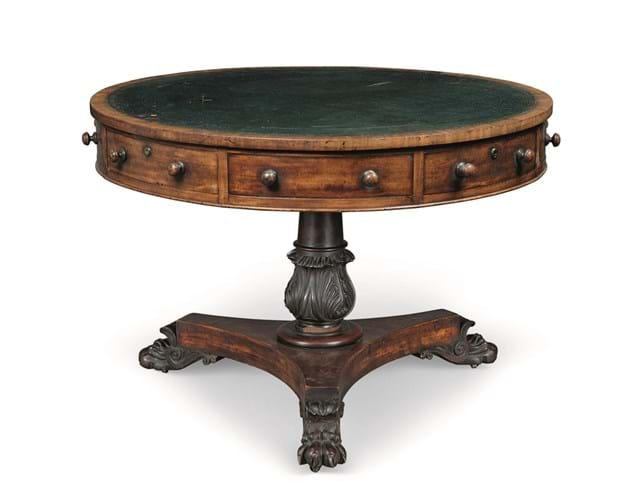
The Department for Digital, Culture, Media and Sport (DCMS) has placed a temporary export bar on a William IV mahogany table following an application to export it after it was bought at auction in December 2017 at Christie’s.
The decision has been made due to the recommendations by the Reviewing Committee on the Export of Works of Art and Objects of Cultural Interest (RCEWA), who deemed its departure from the UK as a misfortune due to its “close connection with our history and national life”.
RCEWA member Christopher Rowell said: “On one occasion, when he was abroad, Dickens precisely described this table and its position in his library so that a friend could locate a set of keys in one of its drawers.
“His art criticism as well as his descriptive writing reveal his aesthetic sensibility and this elegant, if workmanlike, leather-covered mahogany library table was clearly valued by him. Its associations are of considerable interest to lovers of Dickens’ novels and writings.”
The table is believed to have been made c.1835. It has a revolving drum top above eight drawers and is covered in green leather.
According to the RCEWA, it was used by Dickens during most of his career – first in his London home at Devonshire Terrace; then his offices on Wellington Street where he published Household Words and All the Year Round; and finally in his library at Gad’s Hill Place in Higham, Kent, where he died in 1870.
It is also known to have contained the keys to his wine cellar, and appears to be one of the very first objects to have been formally labelled with Dickens’ name. One drawer contains an oval silver plaque stating that the table stood in his library.
“Benefit of the nation”
Experts believe that the table was bequeathed to Dickens’ eldest son Charley, before it was acquired by his younger brother Sir Henry Fielding Dickens at the sale of Gad’s Hill Place in 1878. It remained in the possession of Dickens’ descendants until it was sold at auction last year.
Michael Ellis, minister for arts, heritage and tourism, said: “As one of Britain’s most famous novelists, it is only right for there to be great expectations on us to protect Dickens’ study table for the benefit of the nation.”
The decision to defer the export licence follows a recommendation by the Reviewing Committee on the Export of Works of Art and Objects of Cultural Interest, administered by The Arts Council.
The decision will be deferred until October 26 and can be extended until January 26, 2019, if a serious intention to raise funds to purchase it is made.





